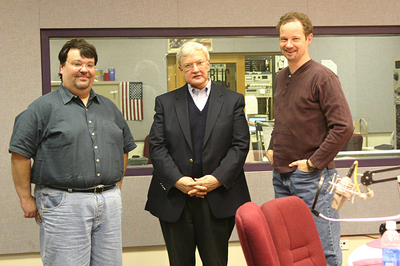Roger Ebert: Intellectual hero, critical inspiration, colleague, and friend
By Jim DeRogatis

Roger Ebert: Intellectual hero, critical inspiration, colleague, and friend
By Jim DeRogatis“This is my happening and it freaks me out!”
Laura Emerick, Roger Ebert’s beloved editor at the Chicago Sun-Times (and one of my favorites as well), introduced me to the man at some stuffy function or other not long after I became the paper’s pop music critic in 1992.
Ebert was the reason I came to Chicago, the Sun-Times, and—second only to rock critic Lester Bangs—a life devoted to writing about and critiquing art. And the line I’d been waiting forever to say to him in person was the one he gave the acid guru Z-man in Beyond the Valley of the Dolls, the brilliantly campy 1970 cult classic that he co-wrote with big-bosoms-loving director Russ Meyer.
“This is my happening and it freaks me out!” I blurted as we shook hands.
Roger gave me the weirdest look I ever saw cross his face and turned and left without saying a word. It was not the best way to a start a relationship: I instantly realized he might have thought I was making fun of him for that notorious little footnote in a stellar career, having no conceivable way to realize that I admired him all the more for writing what I consider a psychedelic-rock masterpiece and one of the best rock movies ever, in the sense of capturing the true spirit of the music.
And not only that, but the second and only other screenplay Ebert penned was the infamous Who Killed Bambi?, his pal Meyer’s sadly never realized Sex Pistols movie! How freaking cool could one human being be???
The answer is cooler than you will ever know, if you weren’t lucky enough to meet him. Though, honestly, if you read him or watched him (really watched him) on television, you pretty much did know him. There wasn’t a significant difference between the public and private Ebert. What you saw was what you got.
Somehow, Roger and I got past that awkward early meeting. I never saw him much; no one at the Sun-Times did. He worked from home for the last 30 years; until he lost the abilities to talk and walk without difficulty, he only came by the paper once a year around Christmas to give everyone in the features department a Movie of the Day calendar to get them through the new year.
Or to show support and cast a ballot at a contentious union vote. Solidarity and the values of true liberalism meant a lot to him, and it wasn’t only lip service.
But for 15 years, Roger would reach out to me every few weeks with a quick email to say how much he enjoyed this review; how much he hated that one (we could not have disagreed more about Juno), or how he’d really appreciate it if I would review that new Neil Young concert movie or this new parody flick about gangsta rap because he had no interest or desire to do so. (He also stuck me with the Spice Girls movie.) The words he wrote for the cover of Let It Blurt, my biography of Bangs, meant the world to me. But even more treasured are the emails he sent me through the long and difficult process of writing about a Chicago R&B star inexplicably acquitted by a jury of his peers.
I am proud today that Roger soon came to know what I really thought about his work and how much he inspired me, because I have written about it a lot and talked about it every chance I’ve ever gotten. How Sound Opinions was, no apologies, my attempt to do what he had done with Gene Siskel. How my teaching Reviewing the Arts at Columbia College was in part an effort to pass along the things I’d learned from him about writing insightfully but accessibly about art. (Every class reads a half dozen Ebert pieces.) How he was so, so much more than the “thumb’s up” or “thumb’s down” of mere opinion that so many mistake today for actual criticism.
The Pulitzer, the influence of the writing, the importance of the television show—you can read about all of that in plenty of other places as we all mourn the loss of the man. I won’t hold you here much longer, except for two more observations.
As a writer and a critical thinker, Ebert deserves to be listed among the very best who’ve done what he did: Oscar Wilde, whose Critic As Artist he personified; H.L. Mencken, another genius who deigned to write in short sentences for the daily newspaper; his beloved Pauline Kael, or my own treasured Bangs. Anybody who says otherwise is, to paraphrase Mencken, a mind that’s simply not worth converting.
Finally, I’d be remiss if I didn’t note that the invitation he extended to host the conversation about Beyond the Valley of the Dolls when he screened it in Champaign at the ninth annual Ebertfest, giving me the honor of speaking for him when he no longer could, to say nothing of introducing the Strawberry Alarm Clock… well, nothing I’ve done as a critic ever has made me prouder.
This was your happening, Roger, and we will freaking miss you.

When Sound Opinions came to WBEZ and Public Radio in 2006, Roger Ebert was one of our first guests. You can listen to that conversation here.